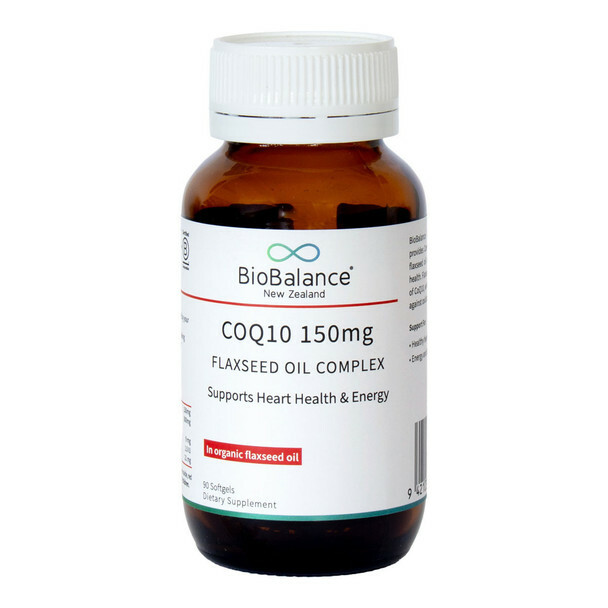
CoQ10 is key for energy production, and crucial for turning the food we eat into energy. Find out what CoQ10 is good for, Naturopath tips to boost energy, and studies that show why CoQ10 is worth considering as an energy supplement - especially as we age.
CoQ10 is what?
Did you know? CoQ10 is deal for anyone looking to support healthy energy, mental focus, a healthy heart and/or brain aging.
CoQ10 (short for Coenzyme Q10), is naturally occurring and found in nearly every cell of our bodies. Studies reveal that levels of CoQ10 are highest busy organs that use lots of energy. Like the brain, heart and liver, which have high rates of metabolism and do lots of important jobs for us – so they need lots of energy to work well.
CoQ10 is used to make energy in our bodies. This energy is used to power every function of our bodies. Considering we have about 30–37 trillion cells, there’s a lot of work that CoQ10 does for us – so it’s fair to say it’s incredibly important for healthy energy levels, for good physical energy and good mental focus.
Why is CoQ10 important?
Based on science, here’s five (of the many) ways CoQ10 supports our health:
- Physical energy and mental focus – by supporting energy production in cells
- Soft aging – via antioxidant protection for the whole body
- Heart health – especially as we age
- Brain health – supports mental clarity and healthy brain aging
- Muscle health – for exercise and people taking cholesterol medication
CoQ10 is a unique, versatile and multifunctional. Our bodies use it in many, many processes. In addition to its role in energy production, it also works as a potent antioxidant to protect mitochondria from free radical damage. Free radicals are a waste by-product of our normal, daily metabolic functions. They lead to oxidation, which is the natural aging process – so anything we can do to protect from free radicals is great for healthy aging.
How does CoQ10 work?
CoQ10 does the heavy lifting for energy production, plus clean-up and maintenance work, to keep us healthy – and energy production happens in the mitochondria (pronounced ‘mytoecondreeah’), and often called the ‘powerhouse of the cell’. CoQ10 is key to this process, which scientists call “oxidative phosphorylation”.
Mitochondria are like tiny, energy generating machines inside our cells. They’re high-performance machines – working 24/7 from dusk to dawn, our entire lives. CoQ10 forms a key component in the performance of these high-output energy machines.
CoQ10 forms a moving part of the mitochondrial machine, but also performs repair and maintenance at the same time. That’s what makes it so special. It keeps the mitochondria healthy – to keep producing energy to power us.
Mitochondrial energy machines are so important to life that they’re unable to shut down – so CoQ10 steps in to perform maintenance and repair work. And it does this even while the ‘energy generator’ whirrs at full speed – incredible right? As an antioxidant, it mops up waste products to protect the moving parts from wear and tear, which if left unchecked can cause damage.
What is CoQ10 good for? Let’s explore CoQ10 benefits
CoQ10 for energy
It was first identified in 1940, and isolated from the mitochondria of beef heart. Our heart and skeletal muscles use the food we eat for energy production. The usable form of energy is a compound called Adenosine Triphosphate, or ATP for short.
CoQ10 for mental focus
Coenzyme Q10 is one of the most significant fat-soluble antioxidants in our body. Our brains are made of fatty tissue - so our brains have a special affinity for fat-soluble antioxidants like CoQ10. CoQ10 is present in brain cells and studies show it can cross the blood brain barrier (BBB) - a gateway that only lets certain things into the brain. It helps support healthy energy production in neurons – our brain cells. CoQ10 supports mitochondrial machines to produce brain power.
CoQ10 for healthy brain aging
Studies show that CoQ10 is a neuroprotective antioxidant – it protects our brain cells from oxidation – the natural aging process. Another reason why it’s worth considering as a supplement, especially once you hit middle age.
Naturopath tips to boost energy
There are things we can do that stimulate our body cells to make more mitochondria. This is called ‘mitochondrial biogenesis’. The more mitochondria we have – the more energy our bodies can make.
Ways to stimulate the body to make more mitochondria:
- Intermittent fasting
This involves periods of fasting and calorie restriction during certain time frames. There are various methods of achieving this, including whole day fasting, alternate day fasting and time restricted feeding, which cause the body to adapt by making more mitochondria.
-
HIT – High Intensity Training
This is a type of interval training that alternates periods of intense aerobic exercise with short rest periods. Even one single 30-minute HIT session has been shown to stimulate the growth of new mitochondria.
-
Endurance training
Regular and sustained exercise can result in higher numbers of mitochondria in muscle cells – it’s part of the reason why regular training can improve fitness. The body adapts by creating more mitochondria to improve its energy generating capacity.
It’s important to check with your health professional before beginning a new diet or exercise programme, to make sure it is right for you.
CoQ10 naturally declines with age
Studies show that CoQ10 levels naturally start to decline after age 20 – which explains why kids can run around all day full of energy, and never get tired. Although the body can make some CoQ10 on its own, scientists have found that CoQ10 production naturally declines as we age.
Research has shown that the rate of mitochondrial biogenesis decreases with age too – so more evidence that Co10 supplements are worth considering once you hit middle age.
CoQ10-rich foods
Our entire bodies usually contain about 500-1500mg of CoQ10. With all these benefits of CoQ10, you’re probably wondering “where can I get CoQ10 in my diet?”.
The recommended daily dose for supplementing CoQ10 is 30-200mg for an adult. Most people only have a dietary intake of 10mg or less of CoQ10 per day, so it can be worth considering a supplement to help fill nutritional gaps.
Some of natural sources of CoQ10 are:
- Free-range chicken (85 g) – 2.3 mg
- Grass-fed beef (85 g.) – 2.6 mg
- Broccoli (steamed, ½ cup) – 0.5 mg
- Cauliflower (boiled, ½ cup) – 0.4 mg
- Pistachios (roasted, 28 g) – 0.6 mg
Coenzyme Q10 is fat-soluble antioxidant, so it’s most easily absorbed when consumed with a small amount of healthy fats – for example: plant oils, nuts, seeds or avocado.
CoQ10 Ubiquinone vs. Ubiquinol?
Ubiquinol and Ubiquinone are both forms of CoQ10. There’s plenty of debate about supplements that contain ubiquinol versus ubiquinone. Inside the body, CoQ10 shifts back and forth between its ubiquinone and its ubiquinol form in a continuous cycle. This is all part of CoQ10’s role in biology – so when you take ubiquinol, it changes to ubiquinone and vice versa as needed.
CoQ10 contraindications
It’s important to check for potential contraindications before adding a new supplement to your regimen. CoQ10 is not recommended to be taken in conjunction with blood pressure and blood thinning medications.
It’s also important to note that CoQ10 supplements are not suitable during pregnancy or while breastfeeding.
CoQ10 and statins
Studies show that people on cholesterol medications have lower levels of CoQ10 in their muscles – it’s a popular supplement for people on statins, and it supports muscle comfort.
Do I take CoQ10 in the morning or at night?
CoQ10 is taken to support daytime energy – so, as with most other energy supplements, it’s best taken in the morning.
It has been linked with wakefulness if taken late at night, so if you take it before lunchtime, it’s highly unlikely to have any effect on your sleep.
Naturopath top pick: BioBalance CoQ10 150mg In Flaxseed Oil Complex
- Provides coenzyme Q10 to support energy production and antioxidant protection
- Good quality CoQ10
- In a base of flaxseed oil – which optimises absorption
- Easy 1-a-day dose
|
|
Always read the label and use as directed. Supplementary to a balanced diet.


